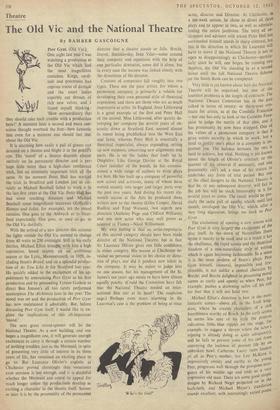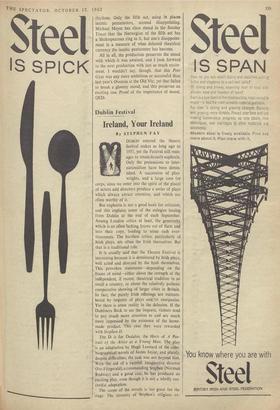Theatre
The Old Vic and the National Theatre
By BAMBER GASCOIGNE ONE night last year I was watching a production at the Old Vic which had the most magnificent costumes. Kings, cardi- nals and potentates had copious trains of damask and the court ladies superbly cut dresses of rich new velvet, and I found myself thinking: here!' A moment later a second and more con- scious thought overtook the first—how fantastic that even for a moment one should feel that about the Old Vic.
It is alarming how easily a pall of gloom can descend on a theatre and blight it in the public's eye. The 'mood' of a theatre depends almost entirely on its permanent director and is per- haps little more than a high-class confidence trick, but an extremely important trick all the same. At the moment Peter Hall has worked the trick in Stratford and London just as cer- tainly as Michael Benthall failed to work it in the last five years at the Old Vic. Peter HaIl has had some crashing disasters and Michael Benthall some magnificent successes (Zetlirelli's Romeo and Juliet, for example), yet the mood remains. One goes to the Aldwych or to Strat- ford expectantly. One goes, or used to go. to the Old Vic dutifully.
With the arrival of a new director this autumn the lights outside the Old Vic seemed to change from 40 watts to 250 overnight. Still in his early thirties, Michael Elliot brought with him a high reputation, based mainly on an ambitious season at the Lyric, Hammersmith, in 1959, in- cluding Ibsen's Brand, and on a splendid produc- tion of As You Like It for Stratford last year. He quickly added to the excitement of his ap- pointment by announcing Peer Gynt as his first production and by persuading Tyrone Guthrie to direct Ben Jonson's all too rarely performed masterpiece The Alchemist later in the year. The mood was set and the production of Peer Gym' has now maintained it admirably. But, before discussing Peer Gym itself. I would like to ex- plore the implications of this all-important `mood.'
The next great mood-spinner will be the National Theatre. As a new building, and one hopes a magnificent one, it will generate enough excitement to carry it through a certain number of teething troubles, just as the Mermaid, in spite of presenting very little of interest in its three years of life, has remained an exciting place to go to. But Laurence Olivier's exploits at Chichester proved alarmingly that sometimes even newness is not enough, and it is doubtful whether the Mermaid can retain its appeal for much longer unless the productions develop as exciting a character as the theatre itself. Sooner or later it is by the personality of the permanent director that a theatre stands or falls. Brecht, Jouvet, Stanislaysky, Jean Vilar—some created their company and repertoire with the help of one particular dramatist, some did it alone, but in every case the success was linked closely with the dynamism of the director.
Creators of companies fall roughly into two types. There are the pure artists, for whom a permanent company is primarily a vehicle for developing their own personal style of theatrical expression; and there are those who are as much impresario as artist. In England, Joan Littlewood is a good example of the first and Peter Hall of the second. Miss Littlewood, after quietly de- veloping her company for several years of ob- scurity down at Stratford East, seemed almost to resent being pitchforked into the West End and fame, whereas Peter Hall is essentially a theatrical imperialist, always expanding, setting up new outposts, conceiving new alignments and pacts. He is on the ladder that leads up to Diaghilev. Like George Devine at the Royal Court (another of the breed), he has commis- sioned a wide range of authors to write plays for him. He has built up a company of powerful new actors and actresses, many of whom have moved steadily into larger and larger parts over the past two years. And during his recent six- month season at the Arts he produced three writers new to the theatre (Giles Cooper, David Rudkin and Fred Watson), two superb new directors (Anthony Page and Clifford Williams) and one new actor who may well prove as talented as Finney—Nicol Williamson.
My own feeling is that an artist-impresario of this second category should have been made director of the National Theatre, but in fact Sir Laurence Olivier gives one little confidence in either category. His season at Chichester re- vealed no personal vision in his choice or direc- tion of plays, nor did it produce new talent in the company. It may be unjust to judge him on one season, but his management of the St. James's ten years ago seems to have been almost equally patchy. (Could the Committee have felt that the National Theatre needed an inter- national film star at its head? The suspicion nags.) Perhaps even more alarming in Sir Laurence's case is the problem of being at once 'Who's the hint?'
actor, director and Director. At Chichester, in a ten-week season, he chose to direct all three plays and to appear in two, as well as adminis- trating the entire jamboree. The bevy of co- directors and advisers with whom Peter Hall has surrounded himself stands in sharp contrast, but this is the direction in which Sir Laurence will have to move if the National Theatre is not to open as disappointingly as Chichester—particu- larly since he will, one hopes, be running two theatres, the Old Vic standing in as a second house until the full National Theatre Scheme on the South Bank can be completed.
Very little is yet known about how the National Theatre will be organised, but one of the knottiest problems is the length of contracts. The National Theatre Committee has in the past talked in terms of twenty- or thirty-year con- tracts for artists, as at the Comedic Francaise —but one has only to look at the Comedic Fran- eaise to judge the merits of that idea, and it has presumably by now been dropped. One of the values of a permanent company is that it gives artists security in which to work, but a need to justify one's place in a company is im- portant too. The balance between the two is hard to achieve, but vital. Nothing is yet known about the length of Olivier's contract, or the manner of his removal if necessary, and one presumably can't ask a man of his stature to undertake any form of trial period. But one of the chief dangers to the National Theatre is that he, or any subsequent director, will fail in the job but will be stuck immovably in it for several years to come. The result would be pre- cisely the same pall of apathy which, until last month, enveloped the Old Vic; which, after a very long digression, brings me back to Peer Gynt. The excitement of opening a new season with Peer Gynt is very largely the excitement of the play itself. In the dawn of Naturalism Ibsen wrote it merely to be read, and as a result it has the ebullience, the rapid scenes and the theatrical freedom of a non-naturalistic style of writing which is again becoming fashionable. In a sense it is the most modern of Ibsen's plays. Peer Gynt himself, immoral, impossible and irre- pressible, is not unlike a central character by Brecht; and Brecht delighted in presenting moral scenes as curtly and openly as when Peer, for example, pushes a drowning sailor off his raft for fear that it will not hold two.
Michael Elliot's direction is best in the more fantastic scenes—above all. in the Troll king- dohhetn, where he creates characters of a rich orrsiebelemnsesslewssorsthuyreofoBrotsletsh. style (heearly scenes ridiculous little. blue ripples on'ethe(hestapgreo,jefcot; emxianndinpg is le to a isruegagdeys t doing stream so re stm w here the actor s quite and he fails to prevent some oufhi:Ini:tatferloYin conveying the lustiness of peasant life by an ournbarlolkeans bawl. Catherine but Leo ceLyrants loudest of )- impressively sweaty and earthy as the Young Peer, progresses well through the pompous arro gance of his middle age and ends as a very impressive old man. There are some good simple designs by Richard Negri projected on to the backcloth, and Michael Meyer's translation sounds excellent, with interestingly varied Poe"
rhythms. Only the fifth act, using in places iambic pentameters, seemed disappointing. Michael Meyer has since stated in the Sunday Times that the Norwegian of the fifth act has a Shakespearean ring to it, but one's disappoint- ment is a measure of what debased theatrical currency the iambic pentameter has become.
All in all, the production preserves the mood with which it was awaited, and I look forward to the next production with just as much excite- ment. I wouldn't say, though, that this Peer Gynt was any more ambitious or successful than fast year's Oresteia at the Old Vic; yet that failed to break a gloomy mood, and this preserves an exciting one. Proof of the importance of mood, QED.







































 Previous page
Previous page